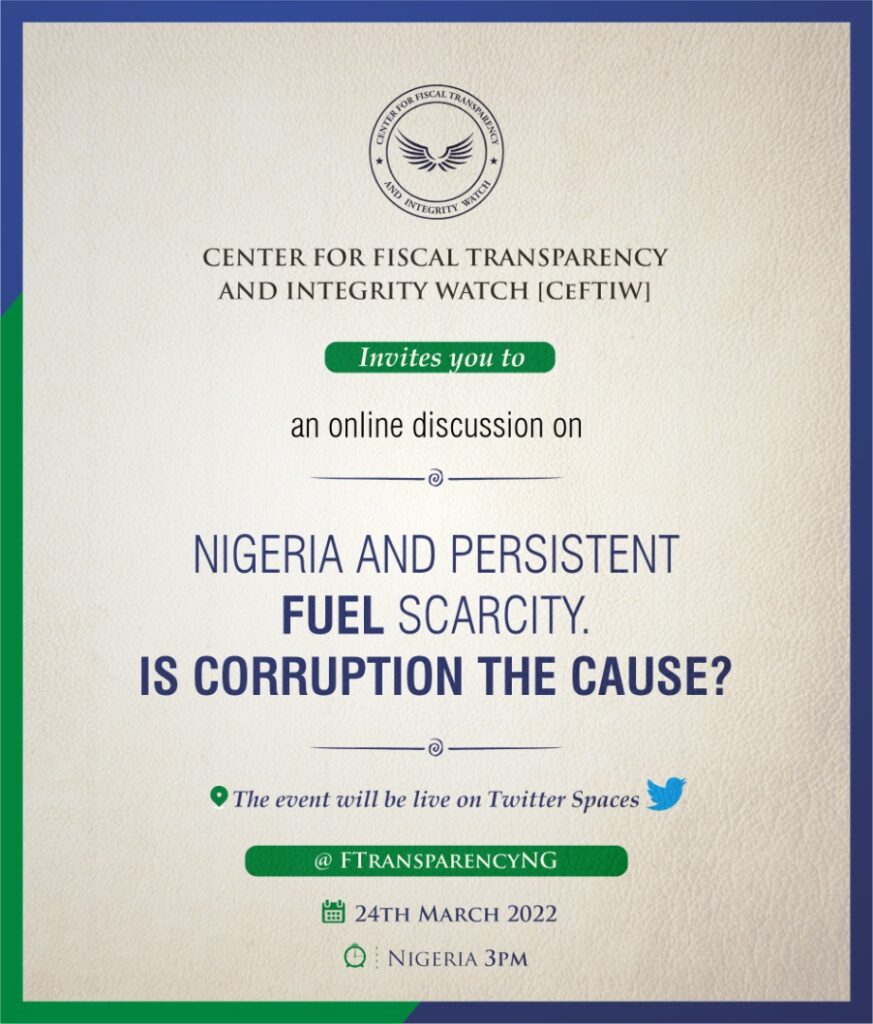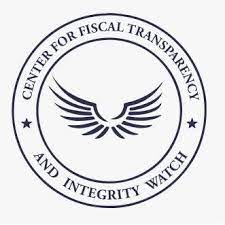At the maiden edition of the Center for Fiscal Transparency and Integrity Watch’s (CeFTIW) weekly Twitter Spaces, initiated to engage stakeholders on topical issues, an expert in the Oil and Gas Industry, Mr. Olabode Sowunmi has harped on the need for transparency in the value chain in order to eradicate corruption in the nation’s petroleum industry.
Sowunmi, a consultant to the Senate Committee on Oil and Gas with more than a decade experience in the industry was speaking to the theme of the maiden conversation: Nigeria and Persistent Fuel Scarcity: Is Corruption the Cause?, and said that until there is greater transparency in the operation of the upstream, midstream and downstream petroleum industry sectors, curbing incessant fuel scarcity will be farfetched.
The Energy Analyst and Consultant, who was a former head of Marketing & Communications for Ericsson (West Africa) stressed that the ongoing fuel scarcity in the country which has historical antecedents is a result of some factors which includes underdevelopment of the value chain, the rising cost of crude oil in the international market, the fall of the naira vis-à-vis the dollar and the peculiar culture of the petroleum industry work culture which encourages corruption.
While responding to the inability of the Petroleum Industry Act (PIA) which was intentioned to eliminate corruption and maximize the sector’s value chain, Sowunmi said that the PIA is only a framework that depends on the institutions, structures and personnel to be effective; “there is no problem with the PIA, laws are only guidance for operators in the system,” he said.
Explaining further, he said: “when people break the law, it is not the fault of the law, it is now an issue for law enforcement; the law itself is not an almighty formula or a magic that is going to resolve everything, it is the basis for arbitration when there is disagreement on what should be done, and what should not be done.
“Everybody has the responsibility to ask the government, law enforcement agencies and the regulators what is happening to the enforcement of the Petroleum Industry Act that has been signed,” the Vice-Chairman, Gas-to-Power Study Group of the Nigerian Gas Association (NGA) added.
He also called for greater transparency in the Upstream Licensing operations, and urged Nigerians to be more involved in efforts to rid the sector of corruption, by officially initiating legal proceedings rather than just murmuring; and noted that when officials are not held accountable for abusing processes, corruption would hold sway.
“An organization works within a system and a system produces a culture, and when culture are not transparent, they tend to promote corruption; everything negative takes place in an atmosphere of darkness, and they don’t tend to take place where there is exposure and light”, he explained.

The forum addressed the issue of oil theft, and called for a total overhaul of the system that promotes thievery. Sowunmi called on the leadership to remove those that make up the culture that encourage oil theft, while genuine efforts are made to sanitize the system urgently for the survival of the nation.
Sowunmi called for greater transparency in the subsidy regime; saying that corruption would happen when people are left with funds without appropriate checks and balances, and independent ways of verifying subsidy figures.
A participant, Abdul M. Idris who decried the lingering fuel scarcity and government’s lack of commitment to its promises of fixing the refineries, also demanded to know what Civil Society Organizations (CSOs) are doing to hold government accountable.
Responding, the Executive Director, CeFTIW said that the Centre has embarked on several advocacies to critical stakeholders to perseverate on issue of transparency and accountability in the public service through its SACEN (Strengthening Anti-Corruption Environment in Nigeria) project. He added that the Center’s Transparency and Integrity Index (TII) Report was equally launched as a pressure advocacy to demand transparency and instill a culture of integrity among public institutions.
He however called on other CSOs to join in advocating for greater transparency and accountability in the Nigeria public sector to forestall corruption in the system.

